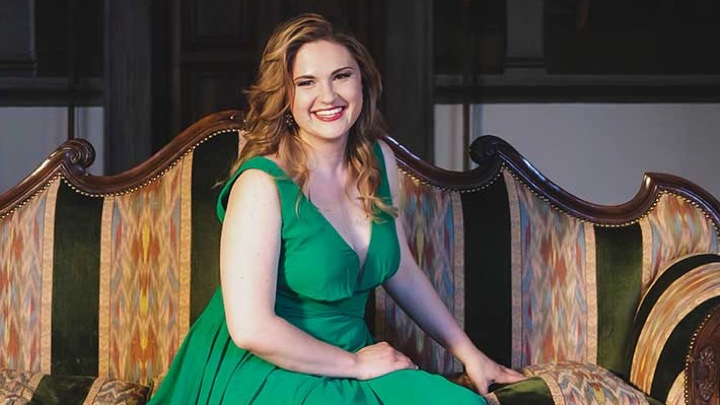
Isotton was certainly a worthy replacement. Making a fiery Met debut, the 37-year-old soprano totally embodied the role–vocally and dramatically–delivering a breath-taking performance that left me yearning for more.
Oh my, what a voice!–sinewy and muscular when it needed to be, with plenty of power to spare, but also buoyant, with a soaring elegance necessary for any verismo role. She possessed a penetrating, spinto quality, well suited to the dramatic intensity of Giordano’s material and the weight of his orchestration. Her middle to lower registers cut through particularly strongly, capable of delivering the libretto’s melodramatic zingers with unadulterated bluster.
Indeed, part of what made Isotton’s vocal performance so magical was the intoxicating energy of the delivery. She may not have had the prettiest voice (it could be a little sinewy at times), but it sure was thrilling. Every phrase felt like a bullet train driving clean through the musical texture–sleek, unstoppable, electrifying.
This sense of intentionality, of directionality, was paired with crystal clear diction and an assured sense of character. Although Isotton was likely thrown into David McVicar’s new production at the very last minute, her Fedora still managed to swallow the scenery by the very strength of her presence.
Princess Fedora Romazoff is a truly detestable character. A gullible old toff, she falls head-over-heels for a philandering gold-digger, who promptly gets himself shot because he can’t keep it in his pants. She then goes full “Q-Anon,” willfully believing any old right-wing conspiracy theory about his death, blaming it on “Nihilist revolutionaries,” randomly accusing people of conspiring against him, and even playing at James Bond in order seduce a confession from his killer.
Isotton did not shy away from the more unsavory facets of Fedora’s character: she was somehow simultaneously flighty, imperious, needy, suspicious, desperate, and hawkish. Although her Fedora did not inspire sympathy per se, it was certainly a Fedora that I wanted to watch. I was magnetized by this character’s unravelling, depicted with such force and passion by Isotton: Indeed, the strength of her performance only made the quiet schadenfreude of Fedora’s downfall all the more delicious.
I was particularly beguiled by the chemistry between Isotton’s Fedora and Piotr Becza?a’s Loris. Becza?a was in particularly fine form on this evening, offering one of the very best performances that I have heard from the tenor in this house. His was a full-throated, red-blooded Loris, ruled by emotion, impulse, and violence.
Although he maintained a lusty, vigorous sound throughout his range, Becza?a was not afraid to let his character’s passions show through in the timbre of the voice, allowing little cracks and growls to color the onset of particularly dramatic notes. Indeed, his was a performance full of daring vocal choices, often eschewing traditional Romantic lyricism in favor of something more rugged, more urgent, more explosive.
His Act II narration was particularly impactful, chock-full of dramatic and vocal punch: quickfire changes in tone and a forceful, declamatory approach to the text helped to bring to life the twists and turns in Loris’s tale, bringing color and tension to this otherwise static moment.
But Becza?a’s best moments were in tandem with Isotton: the pair seemed to elevate each other, feeding off the other’s energy, egging the other on. Not only were they vocally well matched, both possessing a certain vocal muscularity befitting their roles, but they also had a real spunk, a real exuberance together–a certain dramatic alchemy that was absolutely transfixing to watch. The love duet that ends the second act was utterly heart-racing, a masterclass in vocal power and theatrical elan.
Isotton was not the only debut on the Met stage that evening. On this final performance of Fedora, Sergio Vitale made his Met debut in the role of de Seriex.
Aside from the title character, de Siriex is the only role to appear in all three acts of the opera. Yet, in the first act, he’s a bit of a wallflower, taking a backseat to the police inspector Gretch (Lucia Lucas–robust, commanding). It is only in the second act (when he exchanges racist epithets with the Countess Olga) and the third act (when he rides in on a bicycle to deliver bad news to Fedora) that the character truly comes into his own.
Vitale made a fine impression in the second act. His voice was not particularly large and, seated at the very back of the family circle, I often struggled to hear the core of the sound. But he exhibited an exciting high register and a crisp, golden tone during his “party” aria.
Perhaps it was debut nerves (it is a shame that Vitale was not given more performances to warm into this role), but Vitale’s character often felt rather indistinct: his de Siriex frequently seemed to “disappear” during crowd scenes, devoured by the surrounding action. This is a great shame, as Colautti’s libretto writes him as a loud eccentric, even a boor–the kind of guy you would notice enter a room.
Dramatically, Vitale fared much better in the more intimate third act; however, he showed more vocal strain here, with a tremulous quality occasionally entering the voice towards the end of the opera. There was a stiffness, a tension to the delivery that clipped an otherwise well burnished instrument.
Vitale’s wife, Rosa Feola, who has taken the role of Olga from the beginning of the run, also encountered vocal troubles. The role was, on the whole, rather too big for the lyric soprano, who was swamped by the orchestra for much of the second act to the extent that many lines became inaudible. In this musical context, and from the back of the house, the voice sounded thinner than it has in the past, with less roundness and depth than I have come to expect.
But Feola navigated these issues well–by dint of her charming dramatic presence and her sumptuous musicality. Ditzy, bubbly, sassy, cosmopolitan–her Olga brought crackle and fizz to Giordano’s melodrama, fittingly echoed in the perkiness of her vocal production. Phrases had a certain lithe grace to them; yet, Feola tackled longer, lyrical lines with a certain playfulness, leaning into the comedic elements of her character.
Feola truly came into her own in the third act. Olga’s “bicycle” aria saw her voice at its very best: pert, focused, vivacious. As with her husband, I wondered if the more intimate, domestic drama that opens the third act might have been a better fit for Feola than the blazing party scene of the second act.
The rare energy of this performance can be partly attributed to Marco Armiliato’s conducting, which was endowed with particular fervor. Tempi were brisk, insistent, but never rushed. There was a continuous sense of motion, of animation, as if the orchestra were always surging forth with irrepressible force.
Armiliato presented Giordano’s score as a dizzying merry-go-round of sound: a chorus of alp-horns dissolved suddenly into a flurry of birdcalls; a Parisian waltz transformed unexpectedly into a drunken galop. Each shade of musical coloring was presented in bright, timbral technicolor, and musical transitions were quick, sharp, and clean.
There was something decidedly modernistic about the overall sound: the strings played with a slightly raspy (almost ghostly) sound that nicely undercut the gushing lyricism of the score, while the brass had a pungent, acrid quality that seemed to linger within the overall texture. This was not the Fedora of the end of the nineteenth century, but the Fedora of the turn of the twentieth, with Armiliato bringing out the opera’s sharper edges.
David McVicar’s production, by contrast, was nothing but opulence and luxury all the way down. It was truly gorgeous–one of those splendid productions that makes you want to live inside an opera set.
The blocking was simple but campy, leaving plenty of room for the singers to go big if they wanted to. As in his productions of Tosca and Adriana Lecouvreur, McVicar seems pretty content creating a lavish canvas of scenery and costumery on which his singers can more or less walk out the score’s stage directions.
It may not be the most creative or refined approach, but it’s a formula that works well at the Met, where casts often change at a moment’s notice and where limited rehearsal time with big-name singers often renders the dramatically complex impossible.
There was one utterly baffling aspect of McVicar’s production: Sir Dave adds a character to the mise-en-scène during the second and third acts–the ghost of Fedora’s dead fiancé. And (most annoyingly), he kept appearing at the most distracting of moments: he upstaged Becza?a by making strange, constipated gestures during Loris’s narration in Act II and completely ruined the climax of the opera by lurking around during Fedora’s death scene. At one point, Fedora even waltzed with that cursed spirit. I felt like performing an exorcism.
This was a bizarre creative choice, utterly at odds with the verismo style of the drama. Moreover, it added absolutely nothing to the drama. One of the things that makes the character of Fedora so brilliantly campy is the unnatural speed with which she forgets her dead fiancé and falls in love with his killer. It is silly to undercut that.
This was my first time seeing Fedora. I had heard mixed reports before I went. One friend said it was the “worst opera ever written”; another said it was a “wondrous operatic experience.”
I, for one, am now a zealous convert.
For me, it is the perfect opera.
It really has everything. The first act combines the political intrigue of Boris Godunov with a Knives Out-style murder mystery. The second is Manon meets Traviata meets Lisztomania. The third is like if Adriana Lecouvreur took place on the alpine leg of the Tour de France.
The drama is fast-paced. It’s full of fun cameos. The dramatic irony is layered on thick. And there is absolutely no way to perform it with subtlety or nuance.
And above all, it’s just so thoroughly operatic. So much of the drama hinges on the voice. From the coachman’s testimony in the first act (performed with profound dramatic conviction by Jeongcheol Cha), to the drinking songs in the second act, or the many narrations that recount the deaths of characters, or even the letter scene of the final act–the drama is moved forward by characters boldly declaiming things to each other.
There is nothing more operatic than that. It is an opera that presents dramatic situations which dare the voice to be big, bold, and uninhibited.
So, for all that it is cheesy, over-the-top, schmaltzy, and contrived, I can’t help but love Fedora. And judging by the sold-out theater on Saturday night, it seems that New York does too. And with such a strong (if unexpected) debut from Chiara Isotton in the title role, I found myself on my feet during the curtain call, screaming: Viva Fedora!
Photos of Fedora production: Ken Howard / Met Opera



